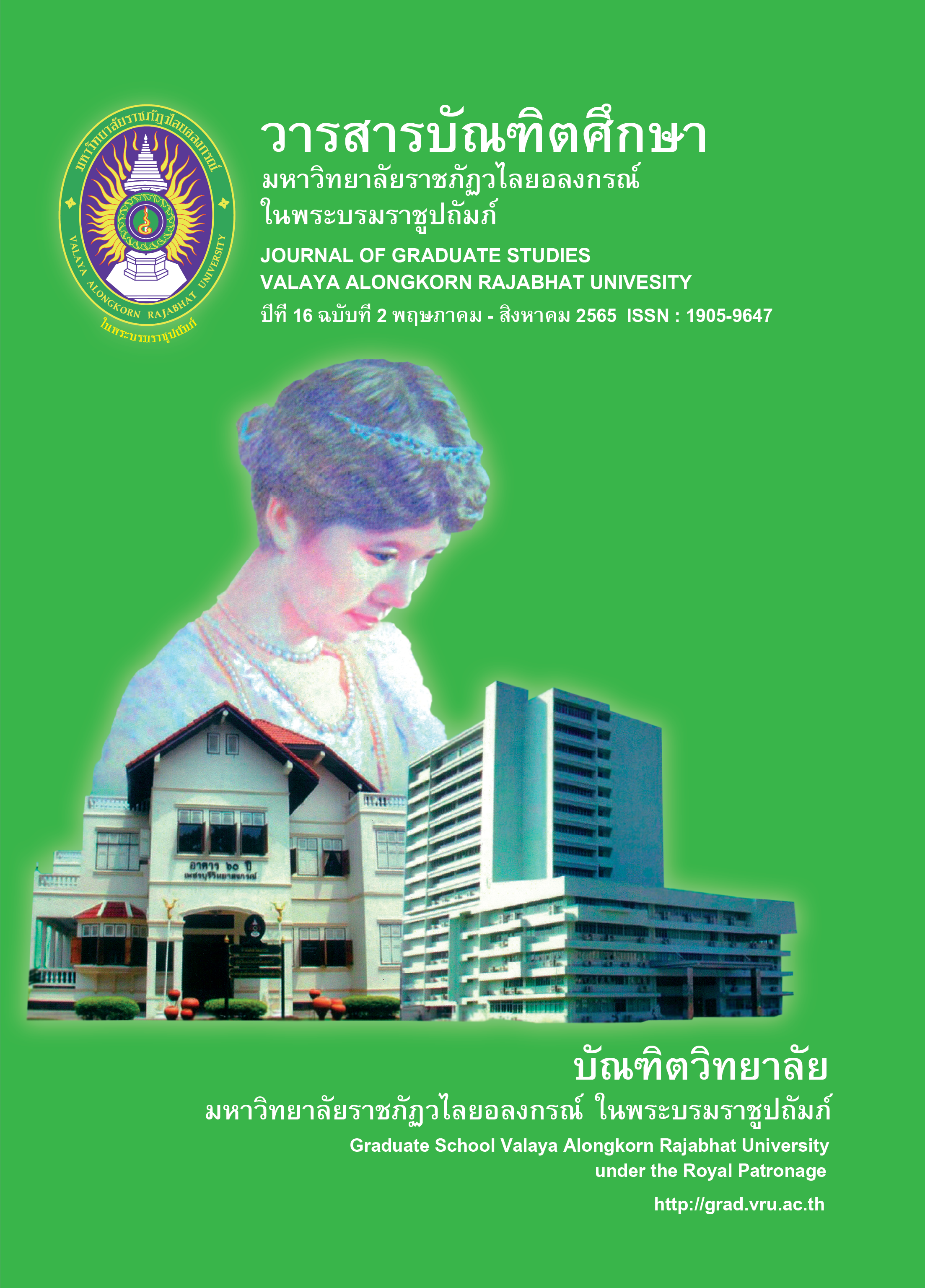อิทธิพลของแรงจูงใจ การใช้สื่อสังคมออนไลน์ การอภิปราย ความรู้และความสามารถ ที่มีต่อการมีส่วนร่วมทางการเมืองของประชาชนในประเทศไทย
Main Article Content
บทคัดย่อ
การวิจัยนี้มีวัตถุประสงค์เพื่อศึกษา 1) อิทธิพลของแรงจูงใจที่มีต่อการใช้สื่อสังคมออนไลน์ 2) อิทธิพลของการอภิปรายทางการเมืองที่มีต่อความรู้ทางการเมือง 3) อิทธิพลของความสามารถ
ทางการเมืองที่มีต่อการมีส่วนร่วมทางการเมือง และ 4) อิทธิพลระหว่างแรงจูงใจ การใช้สื่อสังคมออนไลน์ การอภิปรายทางการเมือง ความรู้ทางการเมือง และความสามารถทางการเมืองที่มีต่อการมีส่วนร่วมทางการเมือง โดยใช้แนวทางการวิจัยเชิงปริมาณ มีรูปแบบการวิจัยเชิงสำรวจใช้แบบสอบถามเป็นเครื่องมือในการเก็บรวบรวมข้อมูลจากประชาชนในประเทศไทยที่เคยใช้สื่อสังคมออนไลน์เพื่อติดตามและค้นหาข้อมูลข่าวสารประเภทต่าง ๆ ทางการเมืองและมีส่วนร่วมทางการเมือง จำนวน 400 คน สถิติที่ใช้ในการวิเคราะห์ข้อมูล ได้แก่ การแจกแจงความถี่ ค่าร้อยละ ค่าเฉลี่ยเลขคณิต ส่วนเบี่ยงเบนมาตรฐาน การวิเคราะห์ถดถอยเชิงซ้อน และการวิเคราะห์การถดถอยเชิงชั้น
ผลการวิจัยพบว่า 1) แรงจูงใจในการใช้สื่อสังคมออนไลน์เพื่อตรวจสอบประเด็นทางการเมือง และแรงจูงในการใช้สื่อสังคมออนไลน์เพื่อนำข้อมูลทางการเมืองไปสื่อสารกับผู้อื่นมีอิทธิพลเชิงบวกต่อการใช้สื่อสังคมออนไลน์ 2) การอภิปรายทางการเมืองไม่มีอิทธิพลต่อความรู้ทางการเมือง 3) ความสามารถทางการเมืองภายในมีอิทธิพลเชิงบวกต่อการมีส่วนร่วมทางการเมืองแบบออฟไลน์ และความสามารถทางการเมืองภายในและความสามารถทางการเมืองภายนอกมีอิทธิพลเชิงบวกต่อการมีส่วนร่วมทางการเมืองแบบออนไลน์ 4) ความสามารถทางการเมืองภายใน สามารถทำนายการมีส่วนร่วมทางการเมืองแบบออฟไลน์ในเชิงบวกได้มากที่สุด ส่วนแรงจูงใจในการใช้สื่อสังคมออนไลน์เพื่อตรวจสอบประเด็นทางการเมือง สามารถทำนายการมีส่วนร่วมทางการเมือง
แบบออฟไลน์ในเชิงลบได้มากที่สุด และความสามารถทางการเมืองภายใน สามารถทำนายการมีส่วนร่วมทางการเมืองแบบออนไลน์ในเชิงบวกได้มากที่สุด
Article Details

อนุญาตภายใต้เงื่อนไข Creative Commons Attribution-NonCommercial-NoDerivatives 4.0 International License.
บทความทุกเรื่องได้รับการตรวจความถูกต้องทางวิชาการโดยผู้ทรงคุณวุฒิ ทรรศนะและข้อคิดเห็นในบทความ Journal of Global of Perspectives in Humanities and Social Sciences (J-GPHSS) มิใช่เป็นทรรศนะและความคิดของผู้จัดทำจึงมิใช่ความรับผิดชอบของบัณฑิตวิทยาลัย มหาวิทยาลัยราชภัฏวไลยอลงกรณ์ ในพระบรมราชูปถัมภ์ กองบรรณาธิการไม่สงวนสิทธิ์การคัดลอก แต่ให้อ้างอิงแหล่งที่มา
เอกสารอ้างอิง
Campbell, A., Gurin, G., & Miller, W. E. (1954). The voter decides. Evanston. IL: Row, Peterson.
Chen, Z., MPhil, & Chan, M. (2017). Motivations for Social Media Use and Impact on Political Participation in China: A Cognitive and Communication Mediation Approach. Cyber Psychology, Behavior & Social Networking. 20(2), 83-90.
Cho, et al. (2009). Campaigns, reflection, and deliberation: Advancing an O–S–R–O–R model of communication effects. Communication Theory. 19(1), 66–88.
Jung, N., Kim, Y., & Gil de Zuniga, H. (2011). The mediating role of knowledge and efficacy in the effects of communication on political participation. Mass Communication and Society. 14(4), 407-430.
Katz, E., Blumler, J. G., & Gurevitch, M. (1974). Utilization of mass communication by the individual. In J. G. Blumler & E. Katz (Eds.), The uses of mass communications: Current perspectives on gratifications research (pp. 19–32). Beverly Hills CA: Sage.
Lazasfeld, P. F., Berelson, B., & Gaudet, H. (1968). The People’s choice: How the voter makes up his mind in a presidential campaign. 3rd ed. New York: Columbia University Press.
Marketingoops. (2019). chamlæ konlayut chai sư̄ lư̄aktang hoksipsō̜ng phakkānmư̄ang hǣ chai khō̜nthēn + sō chīa lamī dīa sāngsāwok [Dissecting tactics using electoral media '62, political parties parade to use 'content + social media' to create followers]. Retrieved form https://www.marketingoops.com/reports/media-stat/content-and-social-media-strategy-thailand-general-election-2019/
Matichononline. (2018). sīang run mai thī yang mai khœ̄i lư̄aktang mī kwā hā lān khon [New Voter of generation 'Never been elected' with over 5 million people]. Retrieved form https://www.matichon.co.th/politics/news_941410
McLeod, D. M., Kosicki, G. M., & McLeod, J. M. (2010). Political Communication Effects. In Bryant, J., & Oliver, B. M. (Eds.), Media Effects Advances in Theory and Research. 3rd ed. (pp.238-251). New York: Routledge.
Muñiz, C., Téllez, N. M., & Saldierna, A. R. (2017). Political sophisitcation as a mediator in the relation between media consumption and citizen participation. Evidence from the O-S-R-O-R model. Communication & Society. 30(3), 255-274.
Palmgreen, P. (1984). Uses and gratifications: A theoretical perspective. Communication Yearbook, 8, 20–55.
Palmgreen, P., Wenner, L. A., & Rosengren, K. E. (1985). Uses and gratifications research: The past ten years. In K. E. Rosengren,
L. A. Wenner, & P. Palmgreen (Eds.), Media gratifications research: Current perspectives (pp. 11–37). Beverly Hills CA: Sage.
Panthanuwong, A. (2017). sư̄ sangkhom ʻō̜nlaifētbuk læ thawittœ̄ kap khwām sončhai khwām phūkphan læ kānmī sūanrūam thāngkān mư̄ang [Social Media, Facebook and Twitter with interests, engagement and political participation]. Journal of Communication Arts. 35(3), 78-93.
Park, C. S. (2015). Pathways to Expressive and Collective Participation: Usage Patterns, Political Efficacy, and Political Participation in Social Networking Sites. Journal of Broadcasting & Electronic Media. 59(4), 698–716.
Park, C. S. (2017). Do Social Media Facilitate Political Learning? Social Media Use for News, Reasoning and Political Knowledge. The Journal of Social Media in Society. 6(2), 206-238.
Perloff, R. M. (2014). The Dynamics of Political Communication Media and Politics in a Digital Age. New York: Routledge.
Pornsakulvanich, V. (2018). sư̄ mai læ kānčhatkān kānsư̄sān [New media and communication management]. Bangkok: Thammasat University Press.
Rubin, A. M. (2002). The uses-and-gratifications perspective of media effects. In J. Bryant & D. Zillmann (Eds.), Media effects: Advances in theory and research. 2nd ed. (pp. 525–548). Mahwah, NJ: Erlbaum.
The Secretariat of House of Representatives. (2018). kānmī sūanrūam thāngkān mư̄ang nai rabō̜p prachāthipatai [Political participation in democracy]. Bangkok: Publishing house The Secretariat of House of Representatives.
Yamane, T. (1967). Statistics; an introductory analysis. 2nd ed. New York: Harper and Row.
Yanjinda, M., & Cheyjunya, P. (2015). kānraprū khāosān kīeokap kānlư̄ak tang phān sư̄ sangkhom ʻō̜nlai kap thatsanakhati læ phrưttikam kānmī sūanrūam thāngkān mư̄ang khō̜ng prachāchon nai khēt Krung Thēp Mahā Nakhō̜n [Information perception concerning the election through social media on the attitudes and behaviors of political participation of citizens in Bangkok]. In kān prachum wichākān radap chāt pračham pī sō̜ngphanhārō̜ihāsippǣt khana nithētsāt læ nawattakam kānčhatkān sathāban bandit phatthana bō̜rihān sāt (kao Mithunāyon 2558) [National Academic Conference 2015, Graduate School of Communication Arts and Management Innovation National Institute of Development Administration (9 June 2015)] (pp. 2-62-2-77). Bangkok: National Institute of Development Administration.


